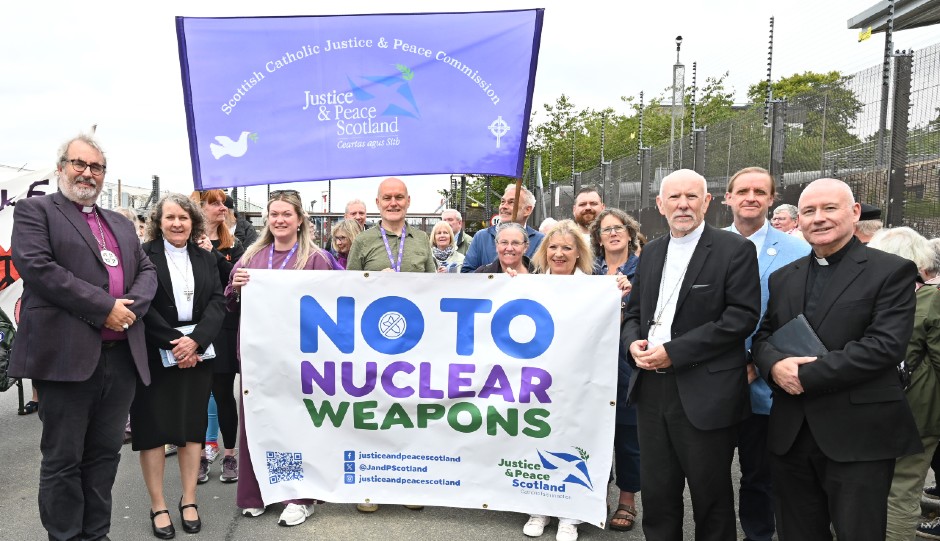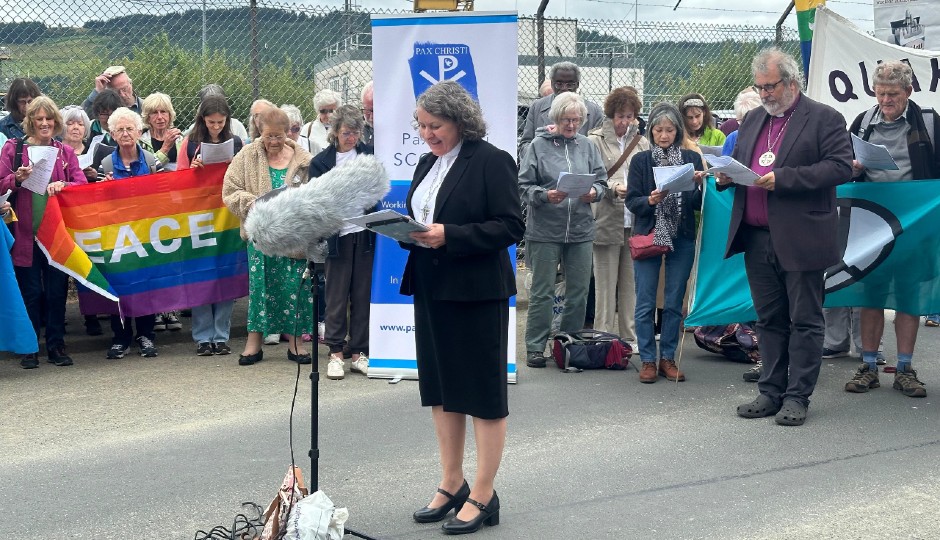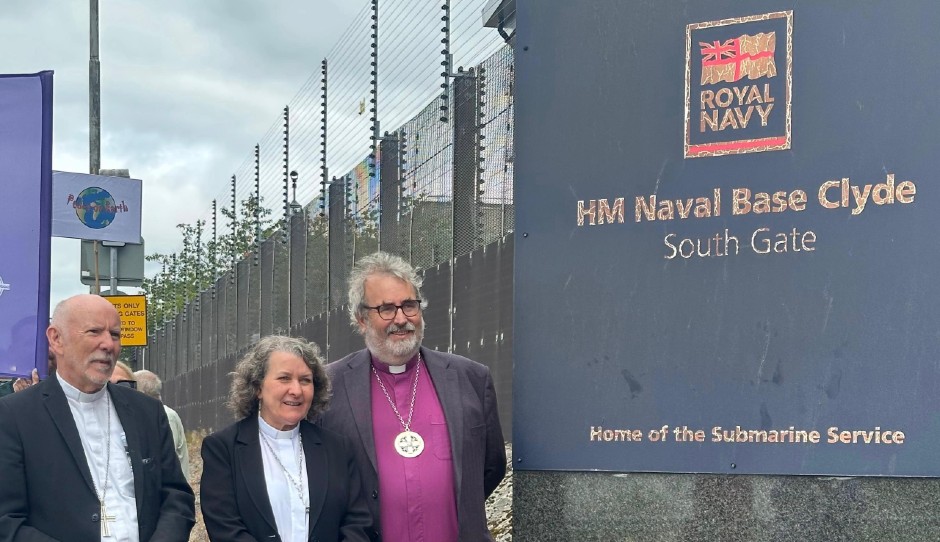The world is in a “warring mess” says Moderator at No to Nuclear Weapons peace vigil
Published on 4 August 2025 4 minutes read
Around 150 people gathered outside HM Naval Base on the Clyde to make a fresh call for a world free of nuclear weapons.
The peace vigil at Faslane was led by representatives of Scotland's three largest Christian Churches and other faith groups to mark the 80th anniversary of atomic bombs being dropped on Japan.

It is estimated that 140,000 people in Hiroshima were killed and at least 74,000 people died in Nagasaki in August 1945, leading to the Japanese government surrendering on 2 September of that year, ending the Second World War.
The No To Nuclear Weapons peace gathering at the South Gate of the naval base on Saturday was organised by Justice & Peace Scotland.
Most Rev William Nolan, Catholic Archbishop of Glasgow and Bishop-President of Justice & Peace Scotland, Rt Rev Rosie Frew, Moderator of the General Assembly of the Church of Scotland, and Most Rev Mark Strange, Primus of the Scottish Episcopal Church, led the event.
They were joined by representatives from the Quakers, the Iona Community, the United Reformed Church and 145 people of faith who stood in solidarity to renew a shared commitment to the common good and the flourishing of creation.
The group came together for prayer and reflection on the immorality of possessing nuclear weapons at a time when conflicts in the Middle East and Eastern Europe rage and the threat posed by these soon-to-be upgraded and expanded stocks in the UK is greater than in recent memory.
The current generation of such warheads – held by nine nations – is understood to be 80 times more powerful than those dropped in Hiroshima and Nagasaki.

Mrs Frew addressed the people who attended the vigil and began by asking them if they, like her, watched the films Barbie and Oppenheimer when they were released in July 2023.
"Oppenheimer was a bio-pic about Robert Oppenheimer, described as the father of the atomic bomb, and his work as director of the Manhattan Project that developed the bombs dropped on Hiroshima and Nagasaki on 6 and 9 August 1945, 80 years ago this week," she said.
"Bombs that were horrifying in their destructive power.
"We know the statistics - tens of thousands killed in the initial explosions, many more later succumbing to radiation poisoning.
"Opinion was and still is divided on the ethical and legal justification for the bombings.
"What have we learned?
"Well, 80 years on and opinion is still divided.
"In the warring mess that is our world at the moment, the threat of the deployment of nuclear weapons is still being used.
"Yet here in Scotland, whilst we stand outside His Majesty's Naval base Clyde, which hosts Britain's nuclear deterrent, the Scottish Government and the Church of Scotland, along with many others, are against the possession never mind the deployment of nuclear weapons."
Peace on earth
Mrs Frew said it is important to remember that the people who work in the naval base are following orders.
"The big decisions are made elsewhere and the last thing they want to be ordered to do is deploy Trident," she added.
"On this anniversary when we remember so much horror and destruction, when we look around our warring world today, we work and hope and pray for peace.
"We cannot hope for a world at peace if we cannot live at peace among ourselves.
"Peace begins with you and me – our attitudes, our actions, the way we treat one another.
"In our homes, in our daily lives, in our communities, in our world.
"Let there be peace on earth and let it begin with you and me."

Located on the Gare Loch near Helensburgh, HM Naval Base Clyde is home to the Royal Navy's four Vanguard-class submarines – HMS Vanguard, Vengeance, Victorious and Vigilant – which each carry Trident 2 D5 nuclear missiles.
Described as Britain's nuclear deterrent and ultimate defence, they can be fired at targets up to 4,000 miles away.
The four Vanguard submarines are due to be replaced by the new Dreadnought-class submarines after 2030.
The UK began developing a nuclear weapons programme at the end of the Second World War, held its first bomb test in 1952 and has operated continuous at sea deterrence since 1969.
Disarmament
Justice & Peace Scotland say Christians are called to be peacemakers and to uphold the dignity of every human life.
"Nuclear weapons are fundamentally incompatible with this call as their existence threatens indiscriminate destruction and a future built on fear and power-wielding rather than on fraternity amongst nations," they said.
Speaking ahead of the vigil, Archbishop William Nolan said: "The phrase ‘never again' gained much currency 80 years ago.
"But the actions of nuclear powers, including our own, run contrary to that.
"As the late Pope Benedict articulated, the very concept of a nuclear deterrence has instead fuelled an arms race as those on opposing sides keep seeking to outdo the other.
"We have seen this in the replacement for Trident. Deterrence itself, therefore, has increased insecurity and does nothing to build up trust which is necessary to encourage disarmament and build up peace."


